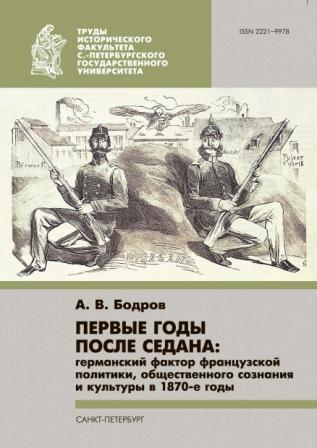Первые годы после Седана: германский фактор французской политики, общественного сознания и культуры в 1870-е годы.
First years after the Sedan:the German factor of the French Policy, public conscience and culture in 1870s
Author(s): Andrey Vladimrovich BodrovSubject(s): History
Published by: Издательство Исторического факультета СПбГУ
Keywords: French-German war 1870-1871; diplomacy; policy; Thiers; McMahon; Bismark; international relations; revanchism; Frankfurt treaty
Summary/Abstract: As far as possible a book makes an attempt to reconstruct the versatile picture of relations between France and Germany within the fi rst years after the end of The Franco-Prussian War of 1870–1871. During that period the role of neighbor for both countries’ foreign and internal policy, including public consciousness and culture, was incomparably high. An American historian Allan Mitchell wasn`t exaggerating, when he wrote following lines in one of his works: “The national history of France ended in the late nineteenth century with the Franco-Prussian War. Thereafter the experience of the French people was o intimately and inseparably related to that of their closest neighbor that a bilateral perspective becomes unavoidable”. However, the results of the Franco-Prussian War fi xed in the states of a Frankfurt peace treaty, concerned not only the winner and the defeated side, welding together both countries with an unseen chain. According to the common point of view the treaty opened also the new chapter of the history of international cooperation at the end of the 19th century: the local war in the heart of Europe changed the situation on the diplomatic arena surprisingly fast. Namely in this meaning of the Frankfurt peace treaty as a cardinally changing the European balance keeps its actuality the analysis and observation of relations between the Great Powers during 1870s. Namely these years represent the time, when the basic priorities had been chosen, which estimation is constantly clarifi ed, especially concerning the appearance of new factors and documents. Inevitably important, unfortunately, still seems the problem of existing confl icts and reaching the balance in relations between the yesterday enemies. An observation of Franco-German relations in the fi rst post-war years after the Frankfurt peace treaty becomes in this case its utter clearness, as far as it embraces the wider period with its logical end in 1914. Taking into account this fi nal, Franco-German relations after 1871 represent a vivid and mostly negative example, what kind of situations should be avoided. Franco-German relations after 1871 year are the relations of two politically new countries — The Third Republic in France and The German Second Empire. A big role in their formation played the foreign policy, a factor of their everyday intercommunication within the diplomatic practice and within the more global and less tangible infl uence at a scale of the public consciousness. These years in France were associated with reconsideration ofthe main causes of its defeat in the War, which results actually produced the question not only of the future existence of France as a great Power, but also of the present state`s position on the international stage. Material losses cannot provide an adequate picture, as far as do not demonstrate the real deep of a break, which can be only seen in dimension of generations.
Journal: Труды исторического факультета СПбГУ
- Issue Year: 2011
- Issue No: 08
- Page Range: 1-376
- Page Count: 378
- Language: Russian

